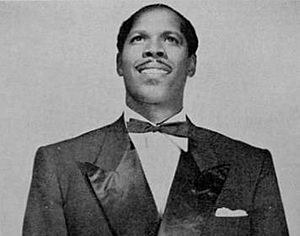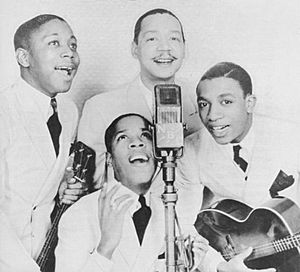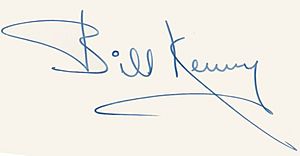Bill Kenny (singer) facts for kids
Quick facts for kids
Bill Kenny
|
|
|---|---|

Bill Kenny
|
|
| Background information | |
| Birth name | William Francis Kenny Jr. |
| Also known as | Mr. Ink Spot |
| Born | June 12, 1914 Philadelphia, Pennsylvania, U.S. |
| Died | March 23, 1978 (aged 63) New Westminster, Canada |
| Genres | |
| Occupation(s) |
|
| Instruments | Tenor vocals |
| Years active | 1932–1978 |
| Labels | Decca, Mercury, Warwick, RCA, TEL, AUB, X (later Vik) |
William Francis Kenny Jr. (June 12, 1914 – March 23, 1978) was an American singer. He had an amazing vocal range, able to sing across four octaves. Many people think Bill Kenny was one of the best high-tenor singers ever. He was known for his clear, bell-like voice and perfect way of speaking when he sang.
Bill Kenny is most famous for being the lead tenor in a group called The Ink Spots. But he also had a very successful solo career after the group broke up in 1954. In the 1950s and 60s, he recorded music, traveled the world, and appeared on many popular TV shows. In 1966, he even hosted his own musical variety show, The Bill Kenny Show, on CBC television. In 1989, 11 years after he passed away, Bill Kenny was added to the Rock and Roll Hall of Fame. He is often called the "godfather" of R&B tenor singers.
Contents
Early Life and How Bill Kenny Started Singing
Bill Kenny was born in Philadelphia, Pennsylvania, in 1914. He spent most of his childhood in Baltimore, Maryland, with his twin brother, Herb Kenny. Herb also later joined The Ink Spots. Their father died when they were five years old. Their mother, Jennie Kenny, then moved the family to Washington D.C. and then to Baltimore. She worked as a dressmaker to support her sons.
Bill first sang in public when he was in third grade at St. Peter's Parochial school. He sang a song called "The Japanese Sandman." Even as a young boy, Bill showed off his high tenor voice. He sang very high notes and performed in school plays. He continued singing in junior high and high school.
Discovering a Special Voice
In a 1944 interview, Bill Kenny talked about his early singing. He said he had been singing since he was seven years old and never had a voice lesson. His teacher discovered him singing in class and arranged for him to perform in the school auditorium. Bill said his voice was "still rather high" even then. Kids never made fun of his high voice; they seemed to enjoy it.
After high school, Bill went to art school in Washington, D.C. But he still sang in amateur contests in theaters around Baltimore and Washington.
Bill Kenny's Amazing Music Career
While on vacation in Atlantic City, New Jersey, Bill Kenny entered 22 amateur singing contests. He won 21 of them! His first professional singing job was at the Ritz-Carlton Gardens in Atlantic City. A manager named Phil Berle heard him sing and signed him to a contract.
Later, Bill sang "Trees" in a contest at the Savoy Ballroom in Harlem. He won first place and earned a spot singing with a group called "The Ink Spots." This was the start of something big!
How Bill Kenny Influenced Other Singers
Bill Kenny's twin brother, Herb, said that singer Morton Downey greatly influenced Bill. Bill would often listen to Downey when he came home from school. Many famous singers have said that Bill Kenny was a major influence on their own music. These include Elvis Presley, Sam Cooke, Michael Bublé, and Jackie Wilson.
Elvis Presley often talked about how much he admired Bill Kenny. Elvis once said he could "honestly never hope to equal the musical achievements of Bill Kenny." In 1971, Elvis even recorded a song Bill Kenny wrote called "There Is No God But God."
Bill Kenny's influence on other vocal groups was huge. Many young Black male singers wanted to be like Bill Kenny and The Ink Spots. They loved the group's sound and their style. Singers from groups like The Clovers remembered how everyone sang Ink Spots songs on the street corners.
Bill Kenny and The Ink Spots
In 1936, Bill Kenny joined The Ink Spots as their first tenor. He made his first recordings with the group that year. His first big solo performance in a studio was in 1938 on a song called "I Wish You The Best Of Everything."
In 1939, The Ink Spots recorded a song called "If I Didn't Care." Bill Kenny sang most of the song, except for the famous "talking bass" part by Orville "Hoppy" Jones. This song sold over 19 million copies and was Bill Kenny's first huge hit. This song also started a new style for The Ink Spots. It featured Charlie Fuqua's guitar intro, Bill Kenny's lead tenor voice, and Hoppy Jones's "talking bass." Other songs featuring Bill Kenny, like "Address Unknown" and "My Prayer", also became top hits in 1939.
The Ink Spots in the 1940s
From 1940 to 1949, Bill Kenny was the lead singer on 40 of the 45 Ink Spots songs that reached the top of the U.S. Pop charts. During this time, Kenny also appeared in two movies: The Great American Broadcast (1941) and Pardon My Sarong (1942).
In 1944, Ella Fitzgerald joined The Ink Spots in the studio. She and Kenny sang together on "Into Each Life Some Rain Must Fall." That song became #1 on both the U.S. Pop and R&B charts. Another song they sang, "I'm Making Believe," also reached #1 on the Pop charts. In 1948, The Ink Spots, with Bill Kenny, appeared on the very first Ed Sullivan Television Show.
The Ink Spots in the 1950s
In 1950, Ella Fitzgerald and Bill Kenny recorded more songs together. In 1950, Bill Kenny's solo song "If" reached #23 on the U.S. Pop charts. Even though these were Bill Kenny's solo recordings, the record company often labeled them as "The Ink Spots."
In 1952, Charlie Fuqua, an original member of The Ink Spots, left to form his own group. This caused some confusion, but Bill Kenny continued performing as "Bill Kenny & His Ink Spots." After 18 years with the group, Bill Kenny decided to leave in 1954, and The Ink Spots officially broke up.
Bill Kenny's Solo Career
Bill Kenny started his solo career in 1951 and continued until he passed away in 1978. Many of his recordings from 1951 to 1953 were released under his own name or "Bill Kenny of The Ink Spots." He recorded many songs for different labels.
Solo Albums by Bill Kenny
In 1951, Bill Kenny released his first album, Precious Memories. A song from this album, "It Is No Secret", reached #18 on the US pop charts. In 1960, he released Mr. Ink Spot, which included songs he made famous with The Ink Spots.
In 1962, he released Bill Kenny Sings The Golden Hits of the Ink Spots. In 1966, his album Remember Me featured songs from his CBC television show. In 1973, he released With Love, which included songs by famous songwriters like Irving Berlin.
Songs Bill Kenny Wrote
Throughout his life, Bill Kenny wrote or co-wrote many songs. One of his compositions, "I Can't Stand Losing You," was recorded by The Ink Spots in 1940. It became a #1 hit on the R&B charts in 1943 and stayed there for seven weeks.
Bill Kenny on Television
Bill Kenny appeared on television many times, both with The Ink Spots and as a solo artist. In 1936, Kenny and The Ink Spots were the first African Americans to appear on television. He was featured on The Ed Sullivan Show multiple times.
As a solo act, he appeared on shows like The Merv Griffin Show and The Steve Allen Plymouth Show. In 1966, he hosted The Bill Kenny Show on CBC Television. He also hosted and performed at many charity telethons in Canada.
Bill Kenny's Personal Life
Bill Kenny was married three times. His last marriage was to Audrey McBurney, a former model from Vancouver, British Columbia. They married in 1949. Audrey later became Bill's business manager.
In 1969, Bill Kenny was badly burned when his sports car's gas tank exploded. He inhaled fumes, which led to breathing problems later in his life. Bill and Audrey stayed married until his death in 1978. Even though he didn't have his own children, Bill became a father figure to Audrey's daughter, Dixie Lee. Bill Kenny was a tall man, standing at six feet, three inches.
Fighting for Civil Rights
Bill Kenny was known for speaking out against racism and for being involved in his community. In 1945, he told a newspaper that he disliked people who treated his race unfairly. He believed in America but felt that democracy didn't apply to him because of his skin color. He said that while he was "Mr. Bill Kenny" on stage, he was treated differently on the streets.
In 1949, Bill Kenny made headlines when he spoke out against prejudice in the South. He was invited to a radio show in Miami Beach, a place usually off-limits to Black people. He needed a police escort to get there. On the show, he and the host talked openly about racial prejudice. They expected many complaints, but instead, the radio station received over 3,000 calls, all supporting Kenny and his views. This showed that many people wanted to end racial barriers.
Helping Others Through Charity Work
In 1973, all the money from Bill Kenny's album With Love and his book of poems, Who Is He, went to help set up a foster home for children in need. In the same year, he received an award for his kindness and outstanding human qualities. Throughout his career, Bill Kenny appeared on many charity telethons, especially those helping children with disabilities or those who were homeless.
Bill Kenny's Passing
Bill Kenny passed away from a breathing illness on March 23, 1978, in New Westminster, Canada. His funeral service was held at the Unitarian Church of Vancouver. His wife, Audrey, asked that the service be kept cheerful. About 200 people, including family, friends, and fans, attended.
Bill Kenny's Voice in Pop Culture
Bill Kenny's voice has been featured in many popular TV shows. These include The Walking Dead, The Simpsons, The Blacklist, and Better Call Saul. His unique high singing voice was often copied on television. For example, Fred G. Sanford (played by Redd Foxx) on the 1970s TV show Sanford and Son would often sing The Ink Spots' hit "If I Didn't Care" while imitating Kenny.
Kenny's voice has also been used in many films, such as The Shawshank Redemption, Radio Days, Raging Bull, and The Aviator. He even appeared as himself in the movies Pardon My Sarong and The Great American Broadcast.
You can also hear Bill Kenny's voice in video games like Fallout, Fallout 3, Fallout 4, L.A. Noire, and BioShock.
US Pop Hits with Bill Kenny as Lead Singer
| Year | Single | Chart positions | ||||
|---|---|---|---|---|---|---|
| US | US R&B |
|||||
| 1939 | "If I Didn't Care" | 2 | — | |||
| "Address Unknown" | 1 | — | ||||
| "My Prayer" | 3 | — | ||||
| "Bless You" | 15 | — | ||||
| "Memories of You" | 29 | — | ||||
| "I'm Gettin' Sentimental Over You" | 26 | — | ||||
| 1940 | "When the Swallows Come Back to Capistrano" | 4 | — | |||
| "Whispering Grass (Don't Tell the Trees)" | 10 | — | ||||
| "Maybe" | 2 | — | ||||
| "You're Breaking My Heart All Over Again" | 17 | — | ||||
| "We Three (My Echo, My Shadow and Me)" | 1 | — | ||||
| "My Greatest Mistake" | 12 | — | ||||
| 1941 | "Please Take a Letter, Miss Brown" | 25 | — | |||
| "Do I Worry?" | 8 | — | ||||
| "I'm Still Without a Sweetheart ('Cause I'm Still in Love With You)" | 19 | — | ||||
| "So Sorry" | 24 | — | ||||
| "Until the Real Thing Comes Along" | 4 | — | ||||
| "I Don't Want To Set the World on Fire" | 4 | — | ||||
| "Someone's Rocking My Dreamboat" | 17 | — | ||||
| 1942 | "Ev'ry Night About This Time" | 17 | 6 | |||
| "This Is Worth Fighting For" | — | 9 | ||||
| "Just As Though You Were Here" | — | 10 | ||||
| 1943 | "If I Cared a Little Bit Less" | 20 | 10 | |||
| "I'll Never Make the Same Mistake Again" | 19 | — | ||||
| "I Can't Stand Losing You" | — | 1 | ||||
| 1944 | "Don't Believe Everything You Dream" | 14 | 6 | |||
| "A Lovely Way to Spend an Evening" | 2 | — | ||||
| "I'll Get By (As Long as I Have You)" | 7 | 4 | ||||
| "Someday I'll Meet You Again" | 14 | — | ||||
| "I'm Making Believe" (Only Bill Kenny & Ella Fitzgerald) | 1 | 2 | ||||
| "Into Each Life Some Rain Must Fall" (with Ella Fitzgerald) | 1 | 1 | ||||
| 1945 | "I'm Beginning to See the Light" (with Ella Fitzgerald) | 5 | — | |||
| 1946 | "The Gypsy" | 1 | 1 | |||
| "Prisoner of Love" | 9 | 5 | ||||
| "To Each His Own" | 1 | 3 | ||||
| 1947 | "You Can't See the Sun When You're Crying" | 19 | — | |||
| "Ask Anyone Who Knows" | 17 | 5 | ||||
| 1948 | "The Best Things in Life Are Free" | — | 10 | |||
| "Say Something Sweet To Your Sweetheart" (Bill Kenny & Herb Kenny with mixed chorus) | 22 | — | ||||
| "You Were Only Fooling (While I Was Falling in Love)" (Bill Kenny & Herb Kenny w/ mixed chorus | 8 | 15 | ||||
| 1949 | "You're Breaking My Heart" (Bill Kenny & Herb Kenny with orchestra) | 9 | — | |||
| "Who Do You Know in Heaven (That Made You the Angel You Are?)" (Bill Kenny & Herb Kenny with orchestra) | 21 | — | ||||
| 1950 | "Echoes" (Bill Kenny solo but labeled "Ink Spots) | 24 | — | |||
| "Sometime" | 26 | — | ||||
| 1951 | "If (They Made Me a King)" (Bill Kenny solo but labeled "Ink Spots") | 23 | — | |||
| "It Is No Secret" (Bill Kenny solo) | 18 | — | ||||
| 1952 | "(That's Just My Way of) Forgetting You" (Bill Kenny solo) | 23 | — | |||
|
 | Anna J. Cooper |
 | Mary McLeod Bethune |
 | Lillie Mae Bradford |



